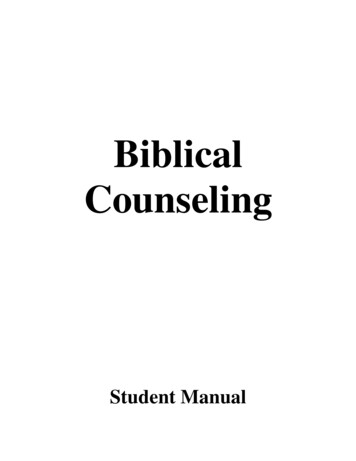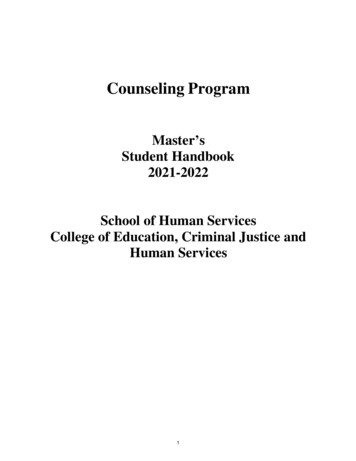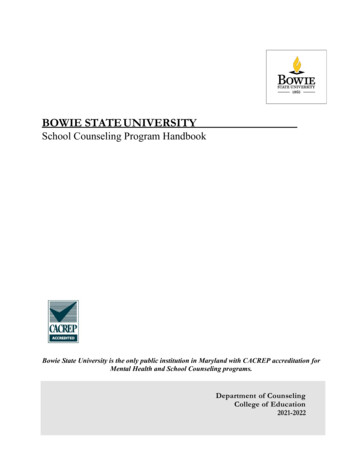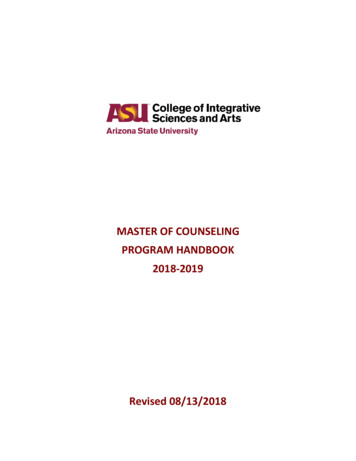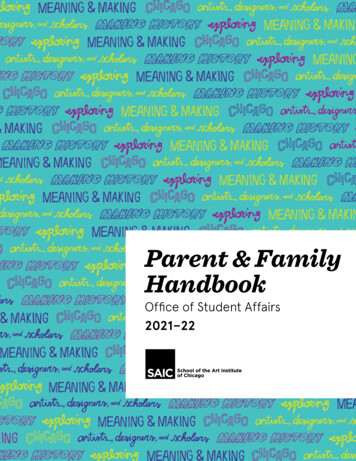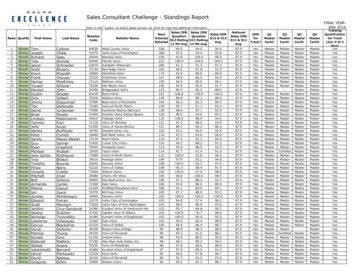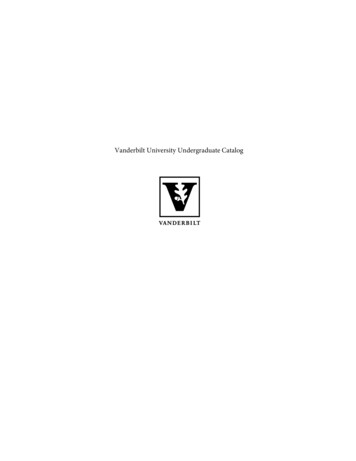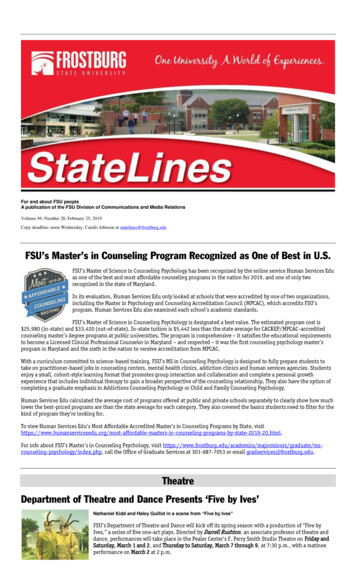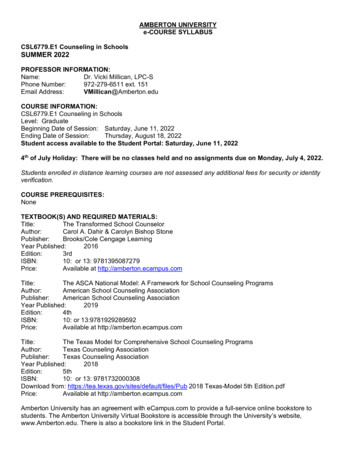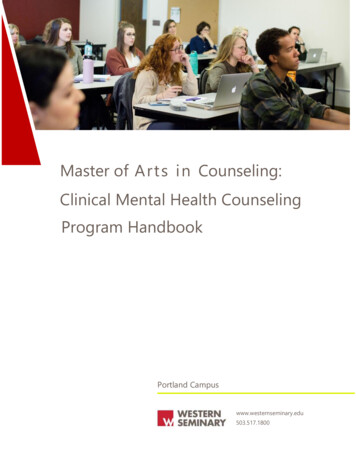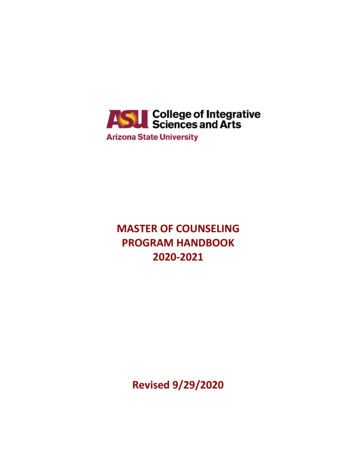
Transcription
MASTER OF COUNSELINGPROGRAM HANDBOOK2020-2021Revised 9/29/2020
LETTER FROM THE FACULTY HEADDear Potential or Current Master of Counseling Student:Thank you for your interest in the Master of Counseling (MC) program in clinical mental healthcounseling at Arizona State University. Our clinical mental health counseling program, which isan approved program under the Arizona Board of Behavioral Health Examiners (AzBBHE),prepares counselors for practice in mental health, education, and social service settings. Upongraduating and passing the National Counselor Examination, graduates are eligible to becomeLicensed Associate Counselors (LACs) in Arizona. After completing two years (3200 hours) ofsupervised clinical work, LACs are eligible to become Licensed Professional Counselors (LPCs) inArizona. Please note, we are no longer accredited by the Council for Accreditation of Counselingand Related Educational Programs.Each year, we select a class of approximately 45 students. We seek students with academicexcellence, relevant work and life experiences, and superior letters of recommendation. Ideally,an applicant would have an undergraduate GPA of at least 3.5, optional GRE test scores in the90th percentile or above, and at least one year of work or volunteer experience in a helpingsetting. We review applicants holistically, so a weakness in one area (e.g., low optional GREscores) could be offset by other strengths. Importantly, we value multicultural knowledge,awareness, and skills. For more detail, please review the Program Admission section of thisdocument.We hold group information sessions during the fall semester. We will post dates and times onour website after September 15. Please join us to learn more about the MC program.If you are an incoming or current student, the pages that follow outline everything you need toknow about the MC program. Please do not hesitate to reach out to your faculty advisor, ourprogram coordinator, or me with any questions.Sincerely,Lisa B. Spanierman, PhDProfessor and Faculty HeadRevised 9/2020 [1]
CONTENTSMISSION STATEMENTPROGRAM OBJECTIVESTRAINING VALUES OF THE MASTER OF COUNSELING PROGRAMPROGRAM ADMISSIONKEY STUDENT OUTCOMESPROGRAM REQUIREMENTSPROGRAM TRACKSCURRICULAMC COURSE SEQUENCINGCLINICAL TRAININGPROGRAM POLICIESISSUES RELEVANT TO ALL MC STUDENTSPERSONAL AND PROFESSIONAL EXPECTATIONS FOR STUDENTSACADEMIC INTEGRITYACADEMIC APPEALS POLICYEVALUATION AND DISMISSAL POLICIESCOUNSELING FACULTYMC FREQUENTLY ASKED QUESTIONS (FAQ)APPENDIX A – MC COURSE SEQUENCEAPPENDIX B – MC COURSE CHECKLISTAPPENDIX C – MC PRACTITIONER TRACK ELECTIVESAPPENDIX D – MC PRACTITIONER TRACK PRE-APPROVED OUTSIDE ELECTIVESAPPENDIX E – COMPREHENSIVE WRITTEN EXAMINATIONAPPENDIX F – MASTER’S THESISAPPENDIX G – SAMPLE REQUIREMENTS AND EXPECTATIONS FOR MASTER’S THESISRevised 9/2020 [2]
MISSION STATEMENTThe mission of the 60-credit hour program is to prepare students to become license eligibleas professional counselors in Arizona and other states with comparable licensurerequirements. With its strong focus on multicultural counseling across the lifespan, studentslearn to promote the health of individuals, families, groups, and organizations in a diversesociety. The program prepares students to work with clients in a variety of mental healthsettings, and also prepares students who wish to pursue doctoral-level studies.PROGRAM OBJECTIVESThe MC program objectives reflect current knowledge and projected needs concerningcounseling practice in a multicultural and pluralistic society. Graduates of the program willdemonstrate:1. Knowledge and application of professional counseling ethics2. Knowledge and application of multicultural counseling and social justicecompetencies3. Knowledge of human growth and development and how it impacts counseling4. Knowledge of career development and ability to design interventions5. Knowledge and skill in establishing counseling relationships and employingintervention models6. Knowledge and skill in group process and ability to intervene using groups7. Knowledge of issues relevant to assessment selection and evaluation, and skill in theappropriate use of assessment instruments8. Knowledge and application of basic research designs, statistics, and programevaluation9. Professional values and dispositions consistent with the American CounselingAssociation10. Knowledge of professional and clinical mental health counselor identityThe MC program is committed to the scientist practitioner model. One manifestation of thatcommitment is the three complementary functions of the program’s Counselor TrainingCenter: service delivery, clinical training, and research.The MC program at Arizona State University is committed to creating an educationalenvironment that reflects the following: A learning community that is respectful of human rights and cultural differences.A curriculum that addresses the complexity of a multicultural society and issues ofdiversity as represented by the populations that counselors serve.A curriculum that reflects expertise and competencies, credentialing, and communityneeds for culturally competent counselors.Opportunities for students to apply their counseling skills in a structured, supervisedRevised 9/2020 [3]
learning environment.A comprehensive program that is open to revision based upon the changing needsof students, faculty, the institution, professional counseling associations, andsociety.A curriculum and learning opportunities that reflect current professional counselingstandards.The Master of Counseling (MC) program is an approved program under the AzBBHE, whichprovides a streamlined pathway to licensure for our master of counseling graduates inArizona. The approval expiration date is October 4, 2023.The faculty has endorsed the following American Counseling Association (ACA)competencies: ALGBTIC Competencies for Counseling LGBQIQA Individuals (2012),Competencies for Counseling the Multiracial Population (2015), Multicultural and SocialJustice Counseling Competencies (2015), Competencies for Addressing Spiritual and ReligiousIssues in Counseling (2009), and Multicultural Career Counseling Competencies (2009).TRAINING VALUES OF THE MASTER OF COUNSELING PROGRAMThe MC Program at Arizona State University subscribes, and expects all students tosubscribe, to the ACA (2014) Code of Ethics. These standards apply to all aspects ofprofessional behavior, including (but not limited to) the practice of counseling, supervision,teaching, research, consultation, and collegial relations. In addition, the program iscommitted to creating and maintaining a positive training climate that (a) allows for openinquiry, free expression, and effective conflict resolution and (b) promotes theunderstanding and affirmation of all aspects of human diversity. The specific implications ofthis position are elaborated as follows:1. Freedom of expression is protected and encouraged. Students are expected toexpress themselves in a professionally responsible manner that demonstratesrespect for others. Certainly, people may differ regarding whether particularcommunications are respectful. Students are urged to work through such difficultsituations by maintaining an open mind, respect and empathy for others, and acommitment to continuing the dialogue. When necessary, faculty may play afacilitative role in these difficult dialogues. Unprotected forms of expression—threats, verbal abuse, and harassment—are not tolerated and will be consideredgrounds for disciplinary action within the program. There are no acceptable excusesfor such behavior; therefore, students are cautioned about what they may say as a“joke” or “in the heat of the moment.”2. An essential part of training is understanding and appreciating all aspects of humandiversity, including sexual orientation, gender, race, ethnicity, culture, language,religion, spirituality, socioeconomic status, ability, and age. Students are expected touse their training to free themselves, as much as possible, from prejudice related toRevised 9/2020 [4]
any of these aspects of diversity. Again, people may differ regarding whatconstitutes prejudice, and students are encouraged to work through these issues inthe manner described in Point (1) above.3. Throughout their training, students should expect to work with colleagues andclients who are different from themselves. Learning to work with different kinds ofpeople is a central goal of professional training. Students who have difficulty inworking with particular kinds of clients must address and resolve these difficulties insupervision.PROGRAM ADMISSIONAdmission to the MC program is based on the applicant’s potential for graduate study,previous preparation and experience, and the possession of personal qualities thatcontribute to success as a counselor. To balance student demand with available resources,the program is limited in the number of students admitted each year. The faculty evaluatethe following during the admission process:1.2.3.4.5.Academic potential.Professional and volunteer experiences in helping-related fields.Personal statement.Recommendation letters from persons able to address areas 1 and 2 above.Finalist Interview.ACADEMIC POTENTIAL (FRK Index, if applicable)Counseling faculty take into consideration a number of factors when reviewing applications.These include: the optional FRK index (see below), personal statement, transcripts, optionalGRE scores, and letters of recommendation.To calculate FRK index, please use the following formula:FRK index Undergraduate GPA (or Jr/Sr GPA) ((GREverbal GREquant)/400)The GRE score in this formula is the “old” GRE score ranging from 200-800. The “new” GREranges from 130-170. You must convert the new GRE to the old GRE and plug it into theabove equation using the ETS conversion table.If you submit the optional GRE Score Report, the program will calculate your FRK index. AFRK index of 5.5 or higher is preferred. For example, a student might obtain a 5.5 FRK indexwith a 3.0 undergraduate GPA and GRE scores of 500 in both the verbal and quantitativeareas. The FRK index formula permits higher GRE scores to compensate for lower GPA andvice-versa.Recruitment activities and admissions recommendations are program-based. All studentsRevised 9/2020 [5]
must be graduates of accredited higher education institutions.Applicants must have a minimum cumulative GPA of 3.00 (scale is 4.00 "A") in the last 60 hours of theirfirst bachelor's degree program, or applicants must have a minimum cumulative GPA of 3.00 (scale is 4.00 "A") in an applicable master's degree program.PERSONAL STATEMENTApplicants are required to submit a 2 to 3 page personal statement (12pt.Times NewRoman font with 1” margin, double-spaced) that indicates their qualifications (e.g.,professional experiences and personal attributes) and interest in ASU’s MC program.Specifically, applicants are asked to describe how their education and training, as well asvolunteer and professional experiences, inform why they want to pursue the MC degree.They also should outline how our program will help them meet their future career goals.Applicants are expected to discuss their ability to work with and be sensitive to the needs ofa multicultural and diverse society, including (but not limited to), members of diverse racialand ethnic groups and sexual minority individuals.RECOMMENDATIONSAt least two and at most three recommendation letters are required. These should be frompersons able to evaluate the applicant’s academic potential (e.g., faculty member) and/orprofessional or volunteer experience (e.g., a supervisor). As part of the online application,applicants are asked to provide the names and email addresses for each of theirrecommenders so that ASU can contact them directly to solicit letters. Applicants arediscouraged from asking for recommendations from individuals or acquaintances who havenot overseen their professional, volunteer, or academic work. Applicants will be asked ifthey do or do not waive the right to review the recommendation sent on their behalf.Each recommender will be informed of the decision and asked to send theirrecommendation electronically to ASU. Do not email, mail or fax materials.THE APPLICATION PROCESSTo apply to the program, applicants must submit the online Graduate Application andsupplemental materials required by the MC program as directed in this section. Inquiriesmay be sent to ccp@asu.edu.Graduate Admission Application. The graduate admission application is submitted online atGraduate College. The online application portal is available starting September 1. It is theapplicant’s responsibility to review the application information and note requirements thatcould delay processing the application, including ensuring the applicant is applying for theappropriate semester for which applications are being accepted. Applicants are responsiblefor ensuring their files are complete.Revised 9/2020 [6]
Supplemental Materials Required by the MC Program. Personal statement as described above—upload as part of the graduate admissiononline application. At least two and a maximum of three completed recommendation letters, submitteddirectly from letter writers (see above). GRE Score Report (optional)—sent separately to ASU Graduate College. UseUniversity Code 4007 for submitting GRE. If a department code is requested, use0000. The GRE test must be retaken if scores are more than five years old. Official Transcripts—sent separately to ASU Graduate College. Electronic submissionof transcripts by an applicant is not accepted. Official transcripts must be forwardedto ASU by the reporting undergraduate institution. Reporting institutions may sendofficial transcripts electronically via transcript clearinghouse or mail to GraduateCollege. An applicant whose native language is not English must provide proof of Englishproficiency regardless of current residency. This program requires a TOEFL score ofat least 600 (pBT) or 100 (iBT).Finalists will be invited for a virtual interview.Timeline. The Graduate Application and all materials required by the MC program must bereceived prior to the annual deadline of the first business day after January 1 forconsideration of entry in the subsequent fall. Applications are considered once a year forthe fall semester only, there is no spring admission.Please allow ample time prior to the deadline for administrative processing (6 weeksrecommended). Responsibility for meeting the deadline is solely that of the applicant.Incomplete files will not be considered. It is the applicant’s responsibility to ensure thatthe file is complete.The MC program reviews all applications and accepts students based on qualifications. Thecommittee’s recommendations will then be forwarded to Graduate College for a decision.The Graduate College will notify applicants about the status of their admission to theprogram via their MyASU (i.e., student communication portal). The program staff cannotrelease information regarding admission decisions.Deferral Policy. In rare circumstances, admitted students may defer their admission to thefollowing fall term. One deferral is permitted per Graduate College policy. Deferrals must berequested officially via MyASU no later than the first day of classes. Students will berequired to reapply for admission if deferral is not requested by this deadline.Affirmative Action. In all admissions, the MC program, the College of Integrative Sciencesand Arts, and the University are committed to Affirmative Action policy.Revised 9/2020 [7]
Advisor Assignments. Upon accepting our offer of admission, students will receive informationrelated to their faculty advisor, program orientation, and guidelines for navigating the programeffectively.KEY STUDENT OUTCOMESInformation on Key Student Outcomes by academic year are available on our webpage.GENERAL PROGRAM INFORMATIONIf your decision to apply for the program is based on specific course requirements, pleaseensure that you have the latest program description before you accept an offer ofadmission and enroll in classes. The program faculty reserves the right to makemodifications to the program, curricula, and evaluation methods to best address student,faculty, program, university, accreditation, and/or community needs.PROGRAM REQUIREMENTSThe following are policies of the MC program, the College of Integrative Sciences and Arts,and/or ASU Graduate College regarding the MC degree:1. A minimum of 60 graduate credit hours approved by the faculty advisor, faculty head, andGraduate College is required for graduation. The information in this section relates to astudent’s interactive Plan of Study (iPOS). The iPOS specifies the requirements that students mustcomplete for their degree and is submitted and revised electronically. To facilitate degreecompletion, graduate students must submit their iPOS by the time they have enrolled in 30 ofthe 60 credit hours required to complete the MC degree. Failure to have an approved iPOS willplace a hold on your student account. You will not be able to enroll into courses. The iPOSbecomes a contract between the University and the student that guides the student incompleting degree requirements.a. All work toward the MC degree must be completed within six consecutive years,beginning with the semester of admission to the program. Graduate courses takenprior to admission that are included on the iPOS must have been completed withinthree years of the semester and year of admission to the program.b. Students complete the iPOS online via their MyASU link. However, the iPOS must beformally approved by the advisor and faculty head. This approval requires thatstudents complete the MC Coursework Checklist with their advisor and obtain theadvisors and then the faculty head’s signatures. The program coordinator will notifythe student when to submit the iPOS electronically.c. Once a student’s official iPOS has been approved, course changes and changes in thecommittee (see below) are submitted electronically via the iPOS. Any changes mustbe approved by the advisor, the faculty head, and Graduate College.d. Students must have an approved iPOS and a three-person committee, with theadvisor as chair, prior to scheduling their comprehensive examination or thesisdefense.e. Students must obtain satisfactory clinical evaluations in pre-practicum, practicum,Revised 9/2020 [8]
f.and internship and earn passing grades in all.Students must achieve a grade point average (GPA) of “B” (3.0) or better on allthree GPAs (iPOS GPA, Overall Graduate GPA, and Cumulative GPA) to maintainsatisfactory academic progress and graduate. If a 3.0 GPA is not maintained, the studentwill be placed on academic probation. The student must work with their advisor to makemeaningful progress toward meeting University and program requirements. Please seeGraduate College Policy and Procedures for greater detail.g. Per program policy, “B-” is the minimum grade permitted on a student’s iPOS. If astudent earns less than a B- in any course, then they must retake the course or itsequivalent.2. ASU Graduate College and the College of Integrative Sciences and Arts have establishedpolicies for accepting equivalent graduate courses completed prior to admission to theMC program. The following policies are adhered to consistently:a. A maximum of twelve (12) semester hours of counseling-relevant graduate levelcourses taken prior to the semester of admittance may be applied to the MCdegree.b. Only courses in which the student has received a grade of “B” or better are acceptedfor credit in meeting equivalent course requirements.3. Students who have taken graduate coursework at other universities that meet thecriteria outlined above, may petition the faculty to waive the ASU requirement in favorof the previous coursework. A separate petition must be filed for each course. A petitionconsists of the following: (a) cover sheet, the Petition for Course Substitution, (b) theprior course syllabus, and (c) any other relevant materials (e.g., bibliographies andexams) that speak to the nature of the course. The student presents the petition to theadvisor, who makes a determination of course equivalence. If the advisor approves, thepetition is forwarded to the instructor(s) of the relevant course(s). If the petition isapproved, the faculty head signs the form, delivers a copy to the student, and places acopy in the student’s file. The student is required to submit these courses on their iPOS.Students should be aware that state licensure boards might require special justificationof courses transferred from other institutions because these courses will not appear onASU transcripts.PROGRAM TRACKSThe MC degree is a 60-semester-hour professional program that prepares counselors for anumber of mental health counseling settings, including colleges, universities, schools,organizational settings, healthcare settings, and community and mental health agencies.The program can be completed in no less than two years. Most students complete theprogram in 2- 3 years. For our students graduating in 2017-2018, approximately 69.6%completed the program in two years (typically including summer enrollment), and 100%completed within three years. The program is designed for full-time students, but thefaculty makes exceptions in cases with extenuating circumstances.Revised 9/2020 [9]
The Practitioner Track places considerable emphasis on supervised field experiences andspecialized clinical coursework. In addition to the core courses, students complete 12graduate credits of clinically-relevant electives (see Appendices C and D). A comprehensivewritten examination is required to complete this track.The Research Track places joint emphasis on developing research competencies along withsupervised field experiences. In addition to the core courses, students complete twostatistics or methods courses. Successful completion of a master’s thesis is required in thistrack.Although the Research Track is designed to meet the needs of students who intend topursue doctoral study with a research emphasis, the Practitioner Track also preparesstudents for doctoral degrees in counselor education and related programs. Bothprepare students for licensure.Refer to Appendix A for course sequences for both Practitioner and Research Tracks.CURRICULAA minimum of 60 credit hours is required to complete the program. All students are requiredto complete the Professional Core (48 credits), plus 12 credits of electives (if on PractitionerTrack) or 12 credits of thesis and statistics/methods (if on Research Track). Please note, at least2 of the 4 elective courses must be taken in our own unit (CCP).THE PROFESSIONAL CORECED 522 Theories of Counseling and PsychotherapyCED 523 Psychological TestsCED 527 Prevention & ConsultationCED 529 Lifespan Human DevelopmentCED 534 Occupations and CareersCED 545 Analysis of the IndividualCED 567 Group Dynamics and CounselingCED 577 Counseling Pre-practicumCED 645 Professional Issues and EthicsCED 671 Multicultural CounselingCED 680 Practicum ClinicaCED 680 Practicum Seminar aCED 684 Internship bCED 501 Introduction to Research and Evaluation in CounselingCED 502 Counseling Research Data AnalysisTotal3 hrs3333333333363348 hrsRevised 9/2020 [10]
Students should be aware that self-exploration and self-knowledge are prerequisites foreffective counseling, and many courses require students to engage in self-reflection.a Counseling Practicum (CED 680) is designed to foster the development of students’counseling skills, promote professionalism, and provide an opportunity for personalgrowth. Faculty approval is required prior to registering for practicum. Prior toregistration for Internship (CED 680), students must obtain faculty approval and submitproof of personal liability insurance. See additional information here. Moreover, studentsmust familiarize themselves with the procedures of the Counselor Training Center (CTC).b Prior to registration for Internship (CED 684), students must obtain faculty approvaland submit proof of personal liability insurance. See additional information here.THE PRACTITIONER TRACKStudents in the Practitioner Track are required to complete the Professional Core (48 credithours) and 4 advisor-approved electives (12 credit hours). Refer to Appendix C for electivesoffered by the Faculty of Counseling and Counseling Psychology. Refer to Appendix D forpre- approved electives offered through other academic departments.Comprehensive Written Exam. Students in the Practitioner Track must pass a standardizedcomprehensive examination in order to graduate. The MC program uses the CounselorPreparation Comprehensive Examination (CPCE). A raw score of at least 76 is required topass. Students not passing on the first administration of this test will have only one moreopportunity to pass the test. If a student fails after two administrations, the student isrecommended for dismissal from the program. Refer to Appendix E for more informationabout the comprehensive exam.THE RESEARCH TRACKAll students are admitted directly into the Practitioner Track. Any student subsequentlyseeking admission into the Research Track should follow these steps:1. Consult with their faculty contact during summer prior to enrollment. The facultycontact will guide the student in how to identify a thesis advisor/chair.2. Follow the suggested course sequence for the Research Track.3. Establish an agreement with a faculty member willing to serve as thesis advisor/chairwho helps to develop the initial research idea into a research proposal. The thesisadvisor/chair must be faculty in the MC program. In rare cases where the chair isoutside of the program, a program faculty member must serve as co-chair.4. The student and thesis advisor jointly inform the faculty head in writing of their contractto work together via the Committee Approval Form. This notification to the facultyhead constitutes admission into the Research Track.5. The student and thesis advisor jointly decide on the other two members of the thesiscommittee, secure their agreement to serve, and notify the faculty head via theCommittee Approval Form. Committee members may be faculty from other programs;however, at least two members must be core faculty in CCP.Revised 9/2020 [11]
6. Submit the interactive iPOS as follows:a. The thesis advisor must be identified on the iPOS as Committee Chair.b. The committee members identified above must be listed as CommitteeMembers on the iPOS.c. The student must choose the thesis option on the iPOS Degree Requirementsscreen when prompted.7. Complete the research proposal to the thesis advisor’s satisfaction and defend theproposal before the thesis committee. The proposal defense and the Report of Master’sThesis Proposal must be completed successfully before conducting the research project.8. In addition to the Professional Core (48 hours), Research Track students generallycomplete:EDP 552 Multiple Regression and Correlation MethodsEDP 554 Analysis-of-Variance MethodsCED 599 ThesisTotal3 hrs3 hrs6 hrs12 hrsPlease note, the AzBBHE reviewed and approved specific equivalent statistics courses for theMC program. Below is a list of pre-approved course substitutes. Course descriptions and detailsare available in the Course Catalog Search on MyASU. Enrolling in to statistics courses that arenot included on the list below may result in issues with licensure through the AzBBHE. Studentsshould consult with their advisors regarding these options below.AzBBHE Pre-Approved Statistics/Methods Options (Discuss with Advisor) EDP 502 – Introduction to Data Analysis EDP 503 – Introduction to Qualitative ResearchMaster’s Thesis. Students in the Research Track must complete and defend a master’sthesis in order to graduate. Students should work closely with their thesis advisor todevelop their research proposal and defense. Refer to Appendix F for more informationabout the Master’s Thesis.Students considering the Research Track should be aware that it is a major commitment oftime and energy on the part of the student and faculty. The decision to enter the researchtrack should be made very carefully and in consultation with the faculty advisor. If thisdecision is not made in the first semester, it is unlikely that the student can complete theResearch Track within two years. Refer to Appendix G for an example of thesisrequirements and expectations.Research Track students, just as Practitioner Track students, are required to complete 600hours of Internship.Revised 9/2020 [12]
MC COURSE SEQUENCINGThe sample course schedules in Appendix A provide three options of how one should enrollfor courses (i.e., Practitioner Track A, Practitioner Track B, or Research Track) to ensure thatcourses are taken in a sequence to optimize progress in the program. Most courses areoffered twice a year but some only once (see CCP Projected Course Offerings).CLINICAL TRAININGStudents need to be aware that it is extremely difficult, if not impossible, to beemployed full time while enrolled in practicum and/or internship. These coursesrequire a significant time commitment (10-12 hours per week for practicum and 20-25hours per week for internship).All students are required to obtain individual professional liability insurance while enrolledin practicum and internship. Because of the many professional benefits of membership inthe American Counseling Association (ACA), including individual professional liabilityinsurance, the program requires proof of membership in ACA prior to beginning CED 680Practicum and CED 684 Internship.Counseling practicum (CED 680). Practicum is a very important course in the training ofcounselors. It is a time when students apply theoretical content to their work with clients atthe Counselor Training Center (CTC). Because we have an ethical imperative to providequality service and to “do no harm,” t
counseling practice in a multicultural and pluralistic society. Graduates of the program will demonstrate: 1. Knowledge and application of professional counseling ethics 2. Knowledge and application of multicultural counseling and socialjustice competencies 3. Knowledge of human growth and development and how it impacts counseling 4.
